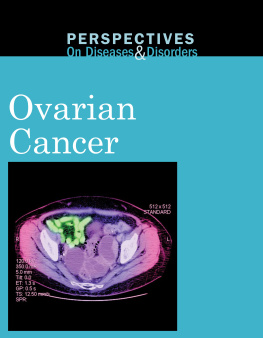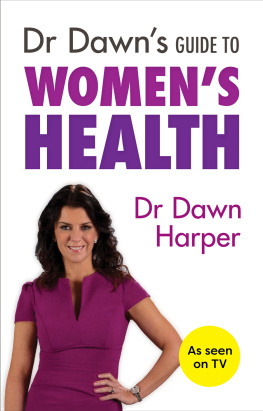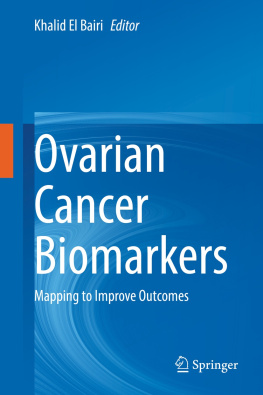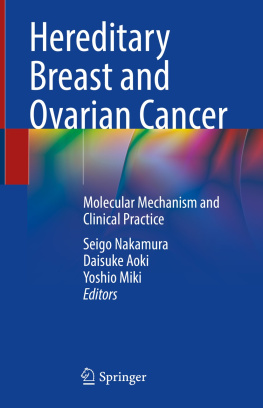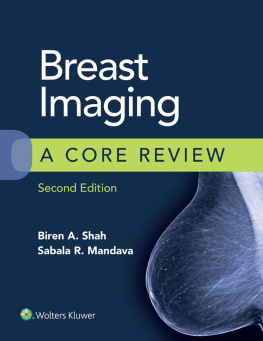A Guide to Survivorship for Women Who Have Ovarian Cancer
A Johns Hopkins Press Health Book
Dr. Robert E. Bristow is Director of Gynecologic Oncology Services, the Philip J. DiSaia Chair of Gynecologic Oncology, Chief of the Division of Gynecologic Oncology, and Professor of Obstetrics and Gynecology, University of California, Irvine.
Dr. Terri L. Cornelison is Associate Director for Clinical Research, Office of Research on Womens Health, Office of the Director, National Institutes of Health, and Assistant Professor of Gynecology and Obstetrics, Johns Hopkins Medical Institutions.
Dr. F. J. Montz was Professor of Gynecology and Obstetrics, Surgery, and Oncology, Johns Hopkins Hospital and Medical Institutions.
A Guide to Survivorship for Women Who Have Ovarian Cancer
second edition
Edited by
ROBERT E. BRISTOW, MD, MBA, FACOG, FACS
TERRI L. CORNELISON, MD, PhD, FACOG
F. J. MONTZ, MD, KM, FACOG, FACS

Note to the reader: This book is not meant to substitute for medical care of women with ovarian cancer, and treatment should not be based solely on its contents. Instead, treatment must be developed in a dialogue between the individual and her physician. Our book has been written to help with that dialogue.
Drug dosage: The author and publisher have made reasonable efforts to determine that the selection of drugs discussed in this text conform to the practices of the general medical community. The medications described do not necessarily have specific approval by the U.S. Food and Drug Administration for use in the diseases for which they are recommended. In view of ongoing research, changes in governmental regulation, and the constant flow of information relating to drug therapy and drug reactions, the reader is urged to check the package insert of each drug for any change in indications and dosage and for warnings and precautions. This is particularly important when the recommended agent is a new and/or infrequently used drug.
2005, 2015 Johns Hopkins University Press
All rights reserved. Published 2015
Printed in the United States of America on acid-free paper
9 8 7 6 5 4 3 2 1
The first edition of this book was published in 2005 as A Guide to Survivorship for Women with Ovarian Cancer, by F. J. Montz and Robert E. Bristow, with assistance from Paula J. Anastasia.
Johns Hopkins University Press
2715 North Charles Street
Baltimore, Maryland 21218-4363
www.press.jhu.edu
Library of Congress cataloging-in-publication data may be found on the final printed page of the book.
A catalog record for this book is available from the British Library.
Special discounts are available for bulk purchases of this book. For more information, please contact Special Sales at 410-516-6936 or .
Johns Hopkins University Press uses environmentally friendly book materials, including recycled text paper that is composed of at least 30 percent post-consumer waste, whenever possible.
Contents
, by Kathleen Ryan, MD
F. J. Montz, MD, KM, FACOG, FACS
Terri L. Cornelison, MD, PhD, FACOG
A Personal Perspective on Surgery
Robert E. Bristow, MD, MBA, FACOG, FACS, and F. J. Montz, MD, KM, FACOG, FACS
Deborah K. Armstrong, MD
A Personal Perspective on Managing Chemotherapy Side Effects
Sharon D. Thompson, BSN, OCN
Richard Zellars, MD
Ana Milena Angarita Africano, MD, and Amanda Nickles Fader, MD
Edward Tanner, MD
Ramez N. Eskander, MD, and Paula J. Anastasia, RN, MN, AOCN
Diljeet K. Singh, MD, DrPH, and Mario Javier Pineda, MD, PhD
A Personal Perspective on Image Recovery 181
Paula J. Anastasia, RN, MN, AOCN
A Personal Perspective on Taking Care of Social Needs
Paula J. Anastasia, RN, MN, AOCN
A Personal Perspective on Genetic Testing
Elizabeth A. Wiley, MS, CGC, and Kala Visvanathan, MD
A Personal Perspective on Therapy Completion and Surveillance
Ritu Salani, MD, MBA
A Personal Perspective on Coping with Recurrences, Maintaining Hope, and Connecting with the Survivor Community
Leslie M. Randall, MD
A Personal Perspective on Considering the End of Life
A Personal Perspective on Making Decisions about the End of Life
F. J. Montz, MD, KM, FACOG, FACS
F. J. Montz, MD, KM, FACOG, FACS
F. J. Montz, MD, KM, FACOG, FACS
Foreword
More than fifteen years ago, three busy clinicians made a decision to write the first edition of this book as a way to help their patients survive ovarian cancer. Rick Montz, Rob Bristow, and Paula Anastasia made time in schedules that had no time because they believed that this book had to be written. They believed that there was information that every patient, family member, and friend needed to know about the journey of ovarian cancer.
Much has changed in those fifteen years. My husband, Rick Montz, died unexpectedly before his book was published, but he would have been honored by the praise it received. The time has come for the book to be updated, for new treatments to be discussed and new information to be presented. The purpose and heart of the book remain the same in this new edition, to bring information, support, and hope to women diagnosed with ovarian cancer. I know that Rick, Rob, and their colleague, Terri Cornelison, are grateful for the opportunity to help so many people and that they hope their readers are empowered by their work.
Kathleen Ryan, MD
INTRODUCTION
Essential Concepts
F. J. Montz, MD, KM, FACOG, FACS
Survivorship
Numerous philosophers have spent numerous hours discussing the life well lived. Most of them would agree that the well-lived life is full of love, experiences, sharing, meaningful relationships, accomplishments, and giving to others. As we all progress along this journey, our attempts to live the well-lived life are threatened by different forces, both internal (for example, disease) and external (for example, social pressures) to ourselves. Ovarian cancer is only one of many such threats to the life well lived. The sense of betrayal by ones own body, the strain on relationships, and the physical toll that the disease and its treatments may inflict are some of the challenges that ovarian cancer presents to living life well. Yet it is the deliberate and conscious choice to live life well that allows us to truly survive as we navigate the uncertainties of human life. That is what this book is about: survivorship in the face of, in spite of, and through ovarian cancer.
What do we mean by survivorship? Of course, part of survivorship is just that: outliving the disease and being around long enough to live out ones natural life expectancy and die of something else. Do you have to be totally free of ovarian cancer to be a survivor? Absolutely not. Does being totally free of any viable cancer cell constitute survivorship? An equally forceful No. Many women die from their ovarian cancer within a relatively short span of years or months, but they survive the experience, being mentally, emotionally, and, within certain limits, physically intact. Similarly, we have had numerous patients who have survived the disease, strictly speaking, but whose lives have been in shambles in all other respects. One woman, the one who actually dies from her cancer, is a survivor; the other, the one who lives many years or even decades disease-free, isnt. What makes the difference?
Next page

